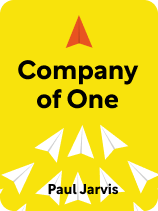

This article is an excerpt from the Shortform book guide to "Company of One" by Paul Jarvis. Shortform has the world's best summaries and analyses of books you should be reading.
Like this article? Sign up for a free trial here.
Are you an expert on your business’s products and services? How easy is it for prospective customers to understand how your product or service works and benefits them?
In Company of One, Paul Jarvis explains how to start and build a company on your own. He contends that customer education is a must, and he outlines what it requires and how it sets your business apart from the competition.
Read more to learn why customer education is important and how you can prioritize it in your business.
Customer Education
When you’re looking for prospective customers, Jarvis suggests playing the role of educator as a sales strategy. Teach people about your product or service, including how to use it so it best serves them.
Customer education requires you to be transparent, clearly demonstrating the strengths of your product or service. When you can show your product’s unique strengths, you’ll stand out against competitors.
(Shortform note: Before you can educate customers about your product, you need to be an expert in it. In The Psychology of Selling, Brian Tracy describes a three-step process for achieving this. First, analyze your product and identify five to 10 of its best features. Ask yourself why a customer buys your product. Additionally, study your customers. What qualities does your ideal customer have? What qualities do most of your existing customers have? What additional customers might benefit from your product? Finally, study your competitors. Identify your primary and secondary competitors and determine how your product outperforms theirs.)
Additionally, by acting as an educator for your product or service, you show customers that you’re the expert in your field, which builds trust. You’re the first person who comes to mind when they need whatever type of product or service you’re offering, and they’re more likely to buy from you.
To teach about your product or service, you might use social media, teach classes that show people how it works, and so on. For example, Toni Okamoto, founder of the website Plant-Based on a Budget, teaches people how to eat a healthy and affordable plant-based diet. Her website has hundreds of free recipes, she posts regularly about plant-based cooking on social media, she speaks about it on podcasts, and she offers a newsletter with recipes and tips.
Anyone can use these resources to learn about her methods and ideas. However, they also act as a sales pitch for her business, through which she sells meal plans and cookbooks and participates in speaking engagements. By giving her knowledge away freely and showing customers how they can be successful with her services, she builds trust and expertise. If people like her content, the free education entices them to invest in her brand further by purchasing her products.
(Shortform note: In Rework, Jason Fried and David Heinemeier Hansson offer several further suggestions for what to share with customers to build trust and credibility. First, they argue that customers love to see how products are made (which is why factory tours are popular). Knowing the inner workings of a business makes the customer feel like an insider, increasing their sense of loyalty. Additionally, Fried and Heinemeier suggest being transparent about your product’s imperfections and shortcomings. Customers will appreciate your honesty and trust you more as a result.)
| Further Benefits of Customer Education Many experts agree that customer education is a valuable sales tactic. First, some research suggests that it increases revenue—customer education adds value for the customer using your product, which makes them more likely to continue using it. This is beneficial because it costs between five and 25 times more to acquire a new customer than to retain an existing one. Education also leads customers to adopt new features quickly and engage with the product more deeply. Finally, educating customers upfront reduces the time and money it costs to help them with support issues later on. When customers already know how to use your product by the time they buy it, you won’t be overwhelmed with customer service requests. |

———End of Preview———
Like what you just read? Read the rest of the world's best book summary and analysis of Paul Jarvis's "Company of One" at Shortform.
Here's what you'll find in our full Company of One summary:
- Why growth-focused companies don't always work
- Why single-person companies often excel in quality and service
- Tips on how to get started with your own single-person company






